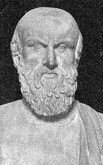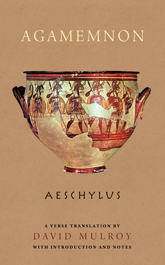Agamemnon
Aeschylus
A verse translation by David Mulroy, with introduction and notes
Wisconsin Studies in Classics
Matthew Roller, Laura McClure, Mark Stansbury-O’Donnell, Series Editors
The first play in Aeschylus’ tragic trilogy the Oresteia
Agamemnon, King of Argos, returns to Greece a victor in the Trojan War. He has brought with him the seer Cassandra as his war-prize and concubine. Awaiting him is his vengeful wife Clytemnestra, who is angry at Agamemnon’s sacrifice of their daughter Iphigeneia to the gods, jealous of Cassandra, and guilty of taking a lover herself. The events that unfold catch everyone in a bloody net, including their absent son Orestes.
Aeschylus (525–456 BC) was the first of the three great tragic dramatists of ancient Greece, a forerunner of Sophocles and Euripides. His early tragedies were largely choral pageants with minimal plots. In Agamemnon, choral songs still predominate, but Aeschylus infuses them with such dramatic feeling that the spectator or reader is constantly spellbound.
Translator David Mulroy brings this ancient tragedy to life for modern readers and audiences. Using end rhyme and strict metrics, he combines the buoyant lyricism of the Greek text with a faithful rendering of its meaning in lucid English.
 Aeschylus (525/4–456/5 B.C.E.) was Greece’s leading playwright between his
first victory at the festival Dionysus in 484 B.C.E. until his death, winning thirteen
first-place crowns in that period. His epitaph, however, boasts only that he
fought bravely for Athens at the Battle of Marathon. Aeschylus (525/4–456/5 B.C.E.) was Greece’s leading playwright between his
first victory at the festival Dionysus in 484 B.C.E. until his death, winning thirteen
first-place crowns in that period. His epitaph, however, boasts only that he
fought bravely for Athens at the Battle of Marathon.
Of Related Interest
|

Oedipus Rex
Sophocles, a verse
translation by
David Mulroy, with
introduction and notes |

Antigone
Sophocles, a verse
translation by
David Mulroy, with
introduction and notes |

Oedipus at Colonus
Sophocles, a verse
translation by
David Mulroy, with
introduction and notes |
|

Larger images
January 2016
LC: 2015010216 PA
104 pp. 5 x 8
|

